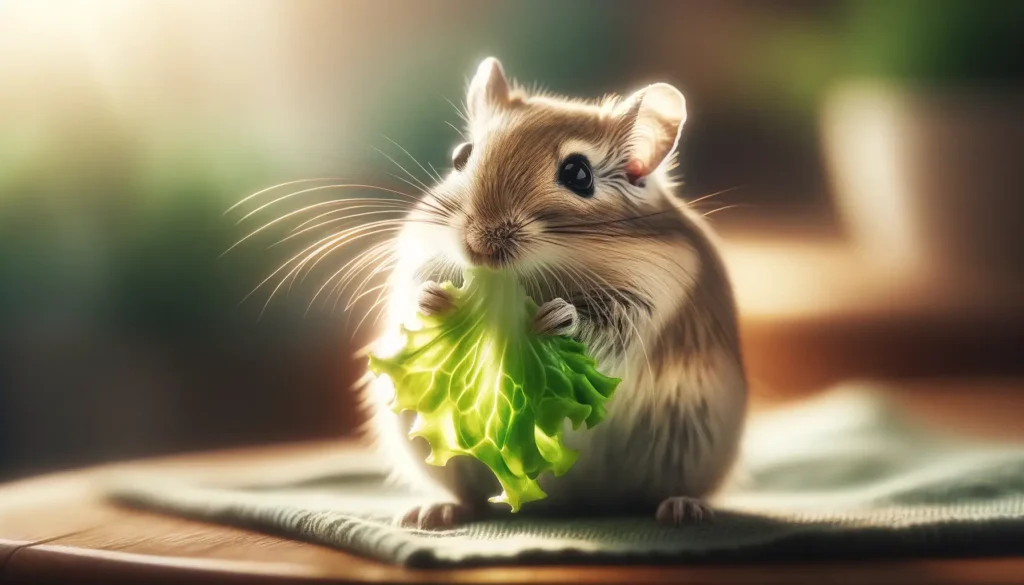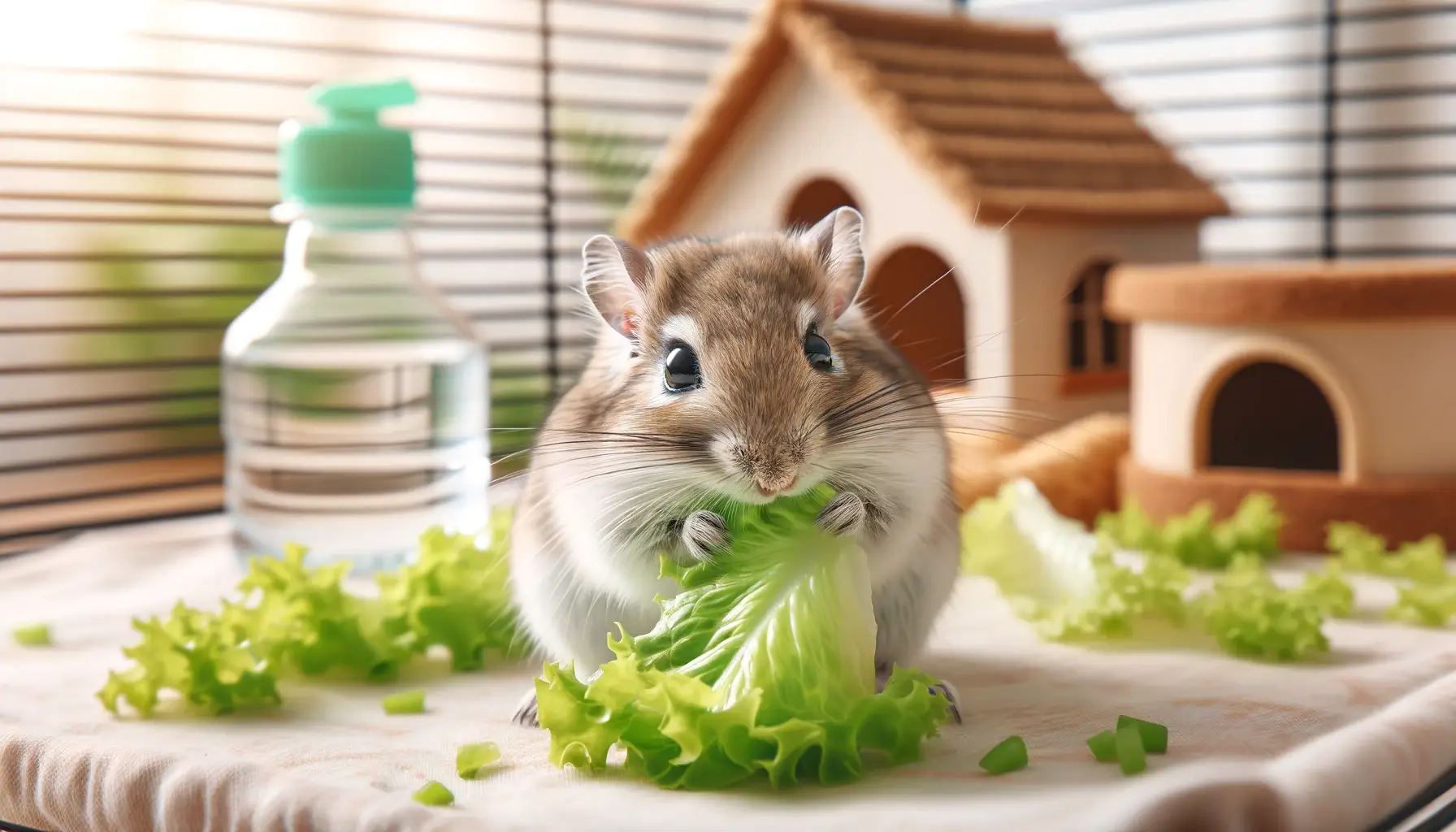Gerbils are charming, curious little creatures that make delightful pets. Their care is relatively straightforward, but when it comes to their diet, pet owners often find themselves pondering over what is safe and what is not.
One common question is: Can gerbils eat lettuce? This article delves into the heart of this question, exploring the types of lettuce that are safe for gerbils, the nutritional value of lettuce, and how it fits into a gerbil’s diet.
Introduction to Gerbils and Their Diet
Gerbils are small, sociable rodents that thrive in environments where they can burrow, explore, and play. Originating from the desert regions of Africa and Asia, these creatures have adapted to a diet that is low in moisture and high in energy.
In captivity, a balanced diet for a gerbil typically includes a mix of seeds, grains, occasional fruits, vegetables, and a source of protein. Understanding the dietary needs of gerbils is crucial for their health and longevity.
Just like any other pet, the key to a healthy gerbil is a well-rounded diet that mimics what they would naturally eat in the wild.
Can Gerbils Eat Lettuce?
Lettuce, a common staple in human diets, is often considered as a potential treat for pets. But can gerbils safely eat lettuce? The answer is yes, but with several key exceptions.
Types of Lettuce Gerbils Can Eat
- Romaine Lettuce: This type of lettuce is safe for gerbils and contains several nutrients beneficial to their health. It’s a better choice due to its higher nutritional content compared to other varieties.
- Leaf Lettuce: Including both red and green varieties, leaf lettuce is another safe option for gerbils. It’s lower in water content than some other types, making it a suitable occasional treat.
- Butterhead Lettuce: Known for its soft, buttery leaves, butterhead lettuce (including Boston and bibb varieties) can also be fed to gerbils in moderation.
Types of Lettuce to Avoid
- Iceberg Lettuce: This variety should be avoided due to its high water content and low nutritional value. Feeding iceberg lettuce to gerbils can lead to diarrhea and provide little to no health benefits.
While lettuce can be a source of hydration and contains some vitamins and minerals, it should only be offered in moderation. The high water content in lettuce, especially in varieties like iceberg, can disrupt a gerbil’s delicate digestive system.
Therefore, it’s essential to choose the right type of lettuce and serve it sparingly as part of a balanced diet.
Nutritional Value of Lettuce for Gerbils

Lettuce is often perceived as a water-rich vegetable with little nutritional value. However, certain types of lettuce, like romaine and leaf lettuce, can offer health benefits to gerbils when fed in moderation.
Lettuce is a good source of:
- Vitamins: Including Vitamin A, which is important for eye health, and Vitamin K, which supports bone health and blood clotting.
- Minerals: Such as potassium and magnesium, which play roles in nerve function and cardiovascular health.
Despite these benefits, lettuce’s high water content and relatively low fiber and protein levels mean it cannot meet all the dietary needs of a gerbil. A gerbil’s diet should primarily consist of a high-quality gerbil mix, with fresh vegetables like lettuce serving only as an occasional treat.
| Nutrient | Amount | Unit |
|---|---|---|
| Energy | 17 | kcal |
| Water | 95.64 | g |
| Protein | 1.23 | g |
| Total lipid (fat) | 0.3 | g |
| Carbohydrate, by difference | 3.29 | g |
| Fiber, total dietary | 2.1 | g |
| Sugars, total including NLEA | 1.19 | g |
| Calcium, Ca | 33 | mg |
| Iron, Fe | 0.97 | mg |
| Magnesium, Mg | 14 | mg |
| Potassium, K | 247 | mg |
| Vitamin C, total ascorbic acid | 4.0 | mg |
| Vitamin A, RAE | 436 | µg |
| Vitamin K (phylloquinone) | 102.5 | µg |
Feeding Lettuce to Gerbils: Best Practices
Lettuce can be a refreshing, hydrating treat for gerbils, but knowing how to properly introduce it into their diet is key to maintaining their health. Here’s how to feed lettuce to your furry friends safely and responsibly.
- Choose the Right Type: Opt for romaine, leaf, or butterhead lettuce. Iceberg lettuce should be avoided since it contains a lot of water and has little nourishment.
- Wash Thoroughly: Always wash the lettuce under running water to remove any pesticides or contaminants. Gerbils are sensitive to chemicals, making this step crucial.
- Serve in Moderation: Cut a small piece of lettuce, about the size of the gerbil’s head, to prevent overconsumption. Excessive intake can lead to digestive issues due to the high water content.
- Monitor Your Gerbil: Observe how your gerbil reacts to lettuce. If you notice any signs of diarrhea or discomfort, reduce the frequency or stop offering lettuce altogether.
Lettuce should be considered an occasional treat, not a staple of your gerbil’s diet. A small piece of lettuce once or twice a week is sufficient. This ensures your gerbil enjoys the benefits of lettuce without the risks associated with overconsumption.
Also read: Can Gerbils Eat Celery?
Common Misconceptions About Feeding Lettuce to Gerbils
There are several myths surrounding the feeding of lettuce to gerbils. Let’s debunk some of the most common misconceptions:
- Lettuce is a Complete Food for Gerbils: This is false. While lettuce can be a healthy addition to a gerbil’s diet, it does not provide all the necessary nutrients for a balanced diet.
- All Lettuce Varieties Are the Same: Not true. Different types of lettuce have varying levels of water content and nutritional value. Choosing the right type is essential for your gerbil’s health.
- Lettuce Can Replace Water: Although lettuce is high in water content, it should not replace your gerbil’s water supply. Fresh, clean water should always be available.
FAQs on Feeding Lettuce to Gerbils
Can Gerbils Eat Lettuce Every Day?
Feeding lettuce to gerbils on a daily basis is not recommended. Although it can be a hydrating treat, its high water content and limited nutritional profile mean it should only complement a balanced diet. To avoid digestive issues and ensure your gerbil receives all necessary nutrients, offer a small piece of lettuce once or twice a week instead.
Is Lettuce Harmful to Gerbils?
Lettuce itself is not harmful to gerbils when fed in appropriate amounts and varieties, such as romaine or leaf lettuce. However, iceberg lettuce should be avoided due to its high water content and low nutritional value. Always introduce any new food, including lettuce, gradually to monitor for any adverse reactions like diarrhea.
Can Gerbils Eat the Stem of Lettuce?
While gerbils can technically eat the stem of lettuce, especially from varieties like romaine, the leafy parts are more nutritionally beneficial and easier to digest. The stem can be harder and less appealing to gerbils, so it’s best to stick to the leaves, ensuring they are washed and served in moderation.
Can gerbils eat lettuce seeds?
Yes, gerbils can eat lettuce seeds in moderation. Lettuce seeds provide essential nutrients like protein, fiber, and healthy fats. However, excessive consumption may lead to digestive issues due to their high fat content. It’s advisable to offer them as occasional treats rather than a staple in the gerbil’s diet to maintain overall health and prevent obesity.
How Much Lettuce Can I Feed My Gerbil?
A small piece of lettuce, about the size of the gerbil’s head, is sufficient for a treat. This amount ensures that your gerbil can enjoy the benefits of lettuce—such as hydration and vitamins—without the risk of overconsumption leading to digestive issues. Limit this treat to once or twice a week as part of a varied and balanced diet.
Conclusion
In wrapping up, lettuce can indeed be a healthy, occasional treat for your gerbil, provided it’s given in moderation and prepared correctly. Always prioritize a balanced diet rich in essential nutrients, with fresh vegetables like lettuce serving as a supplementary treat rather than a dietary staple.
By following these guidelines, you’ll ensure your gerbil not only enjoys a varied diet but also thrives in your care. Remember, the key to a happy gerbil is a well-rounded, nutritious diet.











